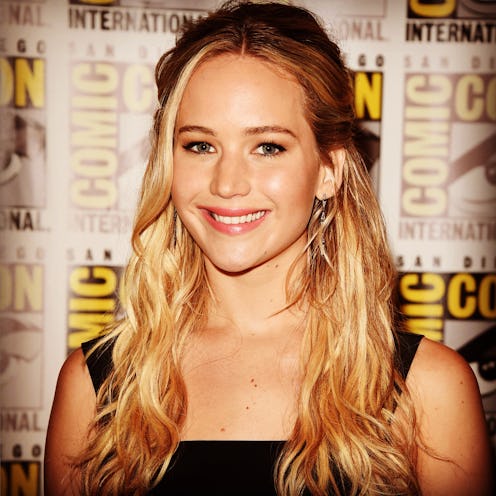Fashion
Where Do Thin Celebs Fit Into The Body Pos Convo?
When celebrities speak out about body positivity, I for one am extremely glad that a message of self-love is being spread to an audience of millions. Seeing these celebs using their platforms to discuss issues in society and the media at large, which affect not just them but also everybody else, feels like a wholly positive act. As body positivity continues to make headlines, however, more and more thin celebs who exercise a certain amount of thin privilege are being hailed body-pos icons — and it's a trend that can cause pretty conflicting emotions for those whose bodies simply don't have that privilege.
IMO, the constant stress that celebrities are under to maintain "perfection" — to be thin but not too thin, to be curvy but not too curvy, to be infallibly beautiful — is an unhealthy and impossible standard to set for anybody. It's likely part of the reason celebrity meltdowns are commonplace, and when you think about it, it's completely understandable. When our jobs stress most of us average folks out, we can at least go to the store in our pajamas, buy two tubs of Ben and Jerry's, and eat them both in the comfort of our own home. For celebs, "off days" just don't seem like an option. They can't go a week without makeup because of a really bad breakout. It would only be caught on camera, scandalized, and then used to sell magazines for a month.
I don't believe for a second that their lives are easy, and being in the public eye undoubtedly lends itself to constant critique and body analysis. But I do believe that there are different ways to be body positive, and that everybody's unique interpretation of body positivity will have a different impact in the movement and those who inhabit it.
I personally think that celebs who are using "body positivity" as a buzzword are doing so from a place of genuine feeling. Though I suppose I can't be sure, it feels cynical to assume that they all have a PR team behind them encouraging them to co-opt "body positivity" because it will get them press and favorable attention. Just consider cases like Demi Lovato's nude photo shoot for Vanity Fair. The star has openly discussed her issues with her self-image and an eating disorder in the past, and this history of struggling with self-love and then openly discussing her journey along the way make her a perfectly viable source of body positivity for many who can relate.
In other cases, however, celebrity positivity can feel like it's not directed at me. This often comes from the ones who are telling me to love myself regardless of the traditional beauty standards of the world, even though they personally match up to those traditional beauty standards in almost every way. These people aren't "like me" because they had a zit once or because they have cellulite. So taking their self-love and applying it to myself doesn't feel quite as applicable, since their experiences in their bodies are so vastly different from mine.
The thing is, thin privilege is very real. Our world at large champions thin bodies, while fat ones are perceived as lazy, dirty, of less value, and of less merit. Fat people get viciously attacked solely based on their size. Fat people don't get to walk into stores and consistently find clothes that fit.
While it would be ridiculous to say that thin humans don't suffer from body image issues (thin shaming is similarly a very real issue), the privilege is still there. Thin folks can turn on the television and see hundreds of bodies similar to their own. They have a certain amount of visibility and acceptance that is light-years away from what other body types receive. When a fat person finds faults with their body, however, there's an entire social structure and fashion and beauty industries that agree with them.
So when a thin celebrity tells me to love my body, I do struggle to take it seriously. After all, they've never really had to have my body, and all the issues that come with that body. I struggle more, however, with the fact that plus size female celebrities so often have to mock their own weight in order to survive in the world of celebrity. Take Rebel Wilson's "Fat Amy" in Pitch Perfect or Melissa McCarthy's character in Bridesmaids , for example. Why do thin celebrities get to champion body positivity, while fat ones have to play fat shaming rhetoric to get ahead?
It's unfair, however, to completely disregard the thin celebs — these beautiful people who we so often celebrate for their beauty. They often seem to be legitimately trying to do some good, and their words of encouragement and championing of self-love will undoubtedly help insecure fans watching them from afar. Young people (yes, that includes thin young people) need to know that self-confidence isn't vanity, and that being open about adoring yourself isn't arrogance. In this respect, the body positivity exercised by thin celebs is absolutely needed.
Although I cannot always empathize with thin, beautiful celebrities who discuss self love while embodying a lot of the rigid beauty standards that have made the body-pos movement necessary in the first place, there are many other people who do. Derailing the contributions that beautiful, thin individuals have made to the community isn't just cynical; it belittles the message of the movement at large. Every body is stunning, every experience is valid, and every voice worthy of being heard.
Want more body positivity? Check out the video below, and be sure to subscribe to Bustle’s YouTube page for more inspo.
